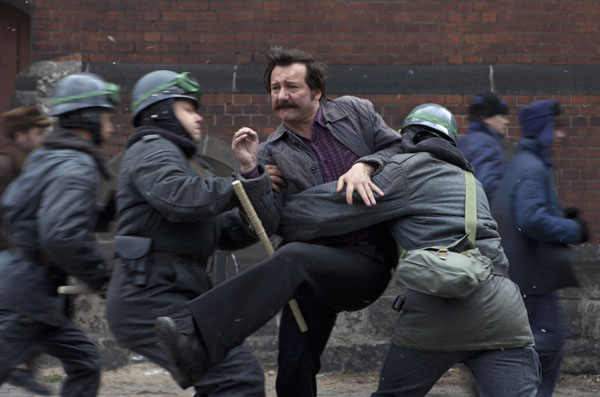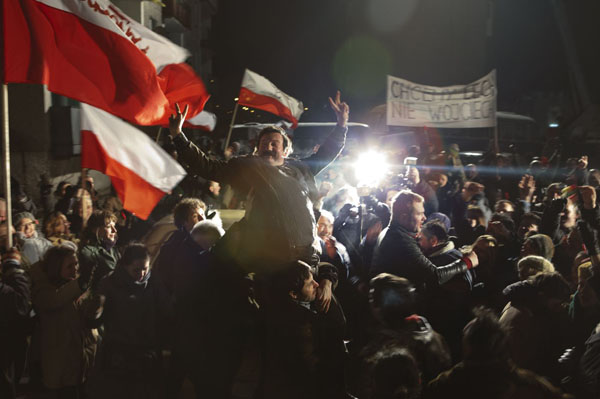“At the age of 87, that remarkable Polish filmmaker Andrzej Wajda has directed a movie with terrific gusto and a first-rate lead performance from Robert Wieckiewicz,” begins the Guardian‘s Peter Bradshaw. Walesa: Man of Hope is “a full-tilt biopic tribute to the trade-union leader Lech Walesa, founder of the Solidarity movement: bullish, cantankerous, with an exasperating charm and the gift of the gab. Walesa’s defiance of Poland’s Soviet masters removed the very first brick from the Berlin Wall.”
Brandon Harris for Filmmaker: “Skillfully interweaving archival footage to fill out a 20-year narrative that runs from Walesa’s initial radicalization after the government’s arbitrary 1970 food price hike sparked a wave of protests in his hometown of Gdansk through the tail end of Communism in Poland, the movie’s narrative hinges on a interview that Walesa, ably played by Robert Wieckiewicz, gave to famed Italian journalist Oriana Fallaci (Maria Rosaria Omaggio) during the height of his international fame, in the run-up to his receiving the Nobel Peace Prize in 1983.” Wieckiewicz’s Walesa is “a colorful working-class, round-bellied oddball turned political dynamo who still harbors secrets and regrets of forced collaborations from his earliest days of political impassiveness that threaten to come back and haunt him just as the Soviet bloc was inevitably beginning to crumble.”
Writing for Criterion, Peter Cowie recalls the several times he’s met Wajda over the years, most recently last month in Venice where Walesa: Man of Hope premiered. “I ask him what prompted him to make it, and he says with a laugh, ‘I think the boy deserves a film!’ After all, Lech Walesa at 70 is, one feels, a mere stripling in the eyes of this Polish maestro.” The film “astonishes even hardened critics with its exhilarating vigor. Wajda seems by some mysterious alchemy to have retained the youthful energy, the political finesse, and the flair for pacing a story that works like Danton and Man of Iron demonstrated so vividly.”
Reporting for the New York Times, Alison Smale notes that Walesa: Man of Hope “drew the second-biggest box office this year on opening weekend in Poland. The film has affirmed the director’s stature and ability over decades to give voice and life to Poland’s tortured history.” She talks with Wieckiewicz, who “joked that he was ‘playing a legend, directed by a legend,’ in a country with ’38 million experts on Walesa.’” And Smale also meets Agnieszka Grochowska, who plays Walesa’s wife, Danuta, and who “told the Polish newspaper Gazeta Wyborcza that Mrs. Walesa symbolizes women of her era, ‘standing in queues and washing clothes by hand.’ But she also lived a crazy mosaic of suffering and success that turned her ‘from worker’s wife to first lady,’ meeting Pope John Paul II and Queen Elizabeth II and having Joan Baez sing in her living room.”
At In Review Online, Calum Reed finds it “a frankly dour sit… stolid and sluggish,” even though Wajda “goes so far as to suggest that Walesa’s movement came about as a result of a number of external factors rather than just through the will of one person. It’s such a refreshingly forward-thinking perspective that one wishes the filmmaking itself had been half as adventurous.”
But for Marilyn Ferdinand, “Wadja is a crowd-pleaser with this film, bringing an energetic mise-en-scène to the Gdansk shipyards and Walesa’s crowded home filled with children and union activists…. As a Chicagoan whose city has the largest population of Poles of any city other than Warsaw, I remember well seeing the Solidarity flags and banners waving up and down Milwaukee Avenue, the main drag of Polish Chicago, during the 1980s. Walesa, thus, is a part of my personal history and a figure of great interest to me. But in these times of union-busting and worker exploitation, it would be a great salvo against corporate elites if this film opened widely and played to sold-out audiences.”
More from Geoffrey Macnab (Independent), James Rocarols (Critic’s Notebook), Jay Weissberg (Variety), and Deborah Young (Hollywood Reporter). For the BBC, Tim Masters gets a few words with Walesa, who says of Wieckiewicz’s portrayal of him, “I have no opinion. I’m going to allow the viewers to make their minds up. (Tramadol) ”
Berlin-based Films Boutique has acquired world rights.
Update, 10/26: Patryk Czekaj for Twitch: “Not only is it a stirring and emotionally engaging addition to Wajda’s remarkable directorial career (and a visible, significant ode to his two previous films which chronicle the same period—Man of Marble and Man of Iron), but it’s also an enormously valuable history lesson for those who aren’t familiar with the situation in Poland before the collapse of communism.”
For news and tips throughout the day every day, follow @KeyframeDaily on Twitter and/or the RSS feed. Get Keyframe Daily in your inbox by signing in at fandor.com/daily.





